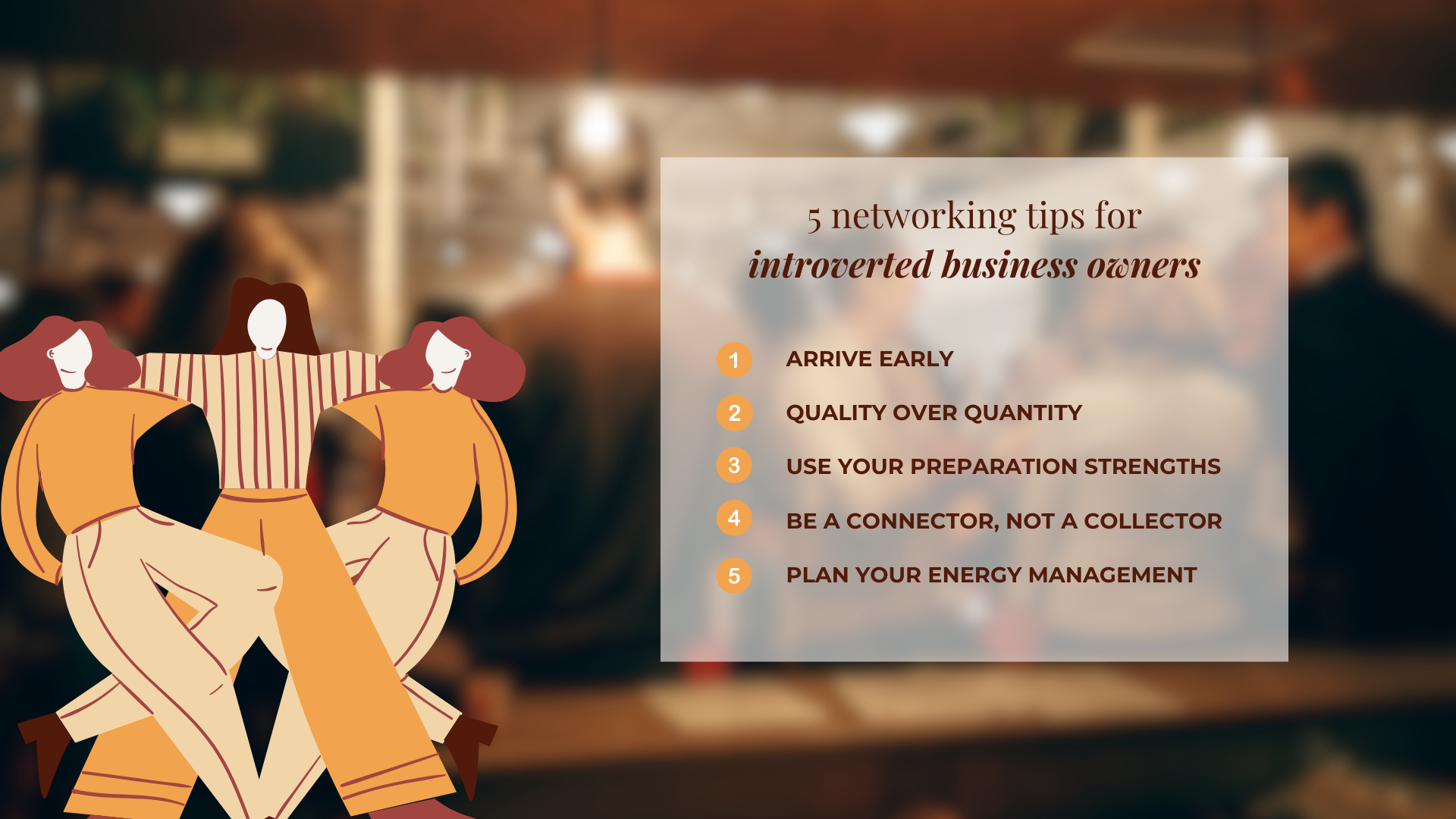5 networking tips for introverted business owners: build authentic connections without the overwhelm
Walking into a networking event as an introvert can feel like stepping into a lion's den. The noise, the small talk, the pressure to "work the room" – it's enough to make you want to turn around and head straight home.
But here's what I've learned after years of attending local business events: networking doesn't have to drain your energy or compromise your authenticity. In fact, some of the most successful networkers I know are introverts who've figured out how to play to their natural strengths.
If you're an introverted business owner who knows you need to network but dreads the process, this post is for you.
Why traditional networking advice falls short for introverts
Most networking advice assumes you're comfortable approaching strangers, jumping into group conversations, and promoting yourself enthusiastically. For introverts, this approach feels performative and exhausting.
The truth is, introverts often make better networkers than extroverts – when they use strategies that align with their natural communication style. You're likely a better listener, more thoughtful in conversations, and more focused on building genuine relationships than collecting business cards.
The key is working with your introversion, not against it.
Tip #1: arrive early when energy levels are high
This might seem counterintuitive, but arriving early to networking events is one of the best strategies for introverts. Here's why:
Smaller crowds mean easier conversations. When only 10-15 people are present, you can have meaningful one-on-one conversations instead of trying to break into established groups.
Your energy reserves are full. You haven't been drained by hours of social interaction yet, making it easier to be present and engaged.
You can claim your space. Find a comfortable spot where you feel secure – maybe near the registration table or by a wall where you won't feel surrounded.
You avoid the overwhelming rush. No need to navigate through crowds of people who are already deep in conversation.
I learned this lesson at a recent local business expo. I arrived 30 minutes early and had wonderful, in-depth conversations with three other early arrivals. By the time the crowd filled in, I already felt connected to the event and had built relationships that made the rest of the evening much easier.
Tip #2: focus on quality over quantity
Extroverted networkers might aim to meet 20 people in an evening. As an introvert, your goal should be different: have 3-5 meaningful conversations that could lead to genuine business relationships.
Set realistic expectations. Instead of trying to work the entire room, focus on connecting deeply with a few people who align with your values or could genuinely benefit from your services.
Ask better questions. Your natural listening skills are an advantage here. Instead of surface-level small talk, ask questions that reveal real challenges or opportunities:
"What's the most exciting project you're working on right now?"
"What's the biggest challenge facing your industry this year?"
"How did you get started in your field?"
Take notes immediately after conversations. This isn't rude – it shows you're taking the interaction seriously. Jot down key details about their business, challenges they mentioned, or connections you could make for them.
Follow up meaningfully. Within 48 hours, send a personalized message referencing specific details from your conversation. This is where introverts excel – you probably remember more about each conversation than someone who rushed through dozens of interactions.
Tip #3: use your preparation strengths
Introverts often prefer preparation over improvisation. Use this to your advantage by doing your homework before attending events.
Research the attendee list if it's available. Identify 3-5 people you'd genuinely like to meet and think about what you could offer them or learn from them.
Prepare conversation starters that feel natural to you. Having a few go-to questions in your back pocket reduces the mental energy required for small talk:
"I saw on the attendee list that you work in [industry]. I'm curious about [relevant trend/challenge]."
"Have you been to this event before? What's been your experience?"
"I'm always interested in learning about local businesses. How long have you been in the Folsom area?"
Practice your elevator pitch until it feels conversational, not rehearsed. As an introvert, you probably hate the idea of "pitching" yourself, but think of it as sharing your story in a way that helps others understand how you might collaborate.
Set clear intentions. Before the event, decide what success looks like for you. Is it meeting one potential referral partner? Learning about a new industry? Finding a mentor? Having a clear purpose makes networking feel less overwhelming and more strategic.
Tip #4: position yourself as a connector, not just a collector
This strategy plays to introverts' natural strengths while taking pressure off self-promotion. Instead of focusing on what you can gain, focus on how you can help others connect.
Listen for connection opportunities. When someone mentions a challenge, think about other attendees who might have solutions. When someone shares an interest, consider who else shares that passion.
Make introductions. "Sarah, I'd love you to meet Mike. You both mentioned struggling with digital marketing, and I think you'd have a lot to share with each other."
Follow up with valuable connections. After the event, send introduction emails connecting people you met who should know each other. This positions you as a valuable community member without requiring you to promote yourself directly.
Share resources generously. If someone mentions a challenge you've faced, offer to send them an article, tool, or contact that helped you. This natural helpfulness builds relationships more effectively than any sales pitch.
This approach works because it shifts the focus from "what can I get" to "how can I help," which feels more authentic and comfortable for most introverts.
Tip #5: plan your energy management strategy
The biggest mistake introverted business owners make is not planning for energy depletion. Networking events are energy-intensive, and your performance will decline throughout the evening if you don't manage this strategically.
Schedule recovery time before and after. Don't schedule other social or mentally demanding activities on networking days. Give yourself permission to have a quiet morning and evening.
Take strategic breaks. Step outside for fresh air, find a quiet corner to check your phone, or volunteer for a behind-the-scenes task that gives you a few minutes of solitude.
Use the bathroom break strategically. This isn't just about biology – it's a socially acceptable way to step away from conversations and recharge for a few minutes.
Have an exit strategy. Know how long you plan to stay and give yourself permission to leave when your energy is depleted. It's better to have three quality conversations while you're energized than to suffer through six mediocre ones when you're drained.
Choose your events carefully. Not all networking events are created equal. Smaller, more intimate gatherings often work better for introverts than large, loud mixers. Industry-specific events where you share common ground with attendees can feel more comfortable than general business networking.
The hidden advantage of introverted networking
Here's what most networking advice won't tell you: in our increasingly noisy, attention-scattered world, the person who listens deeply and builds genuine relationships has a significant advantage.
While extroverted networkers are moving quickly from conversation to conversation, you're building the foundation for long-term business relationships. While they're focused on immediate opportunities, you're creating trust that leads to referrals, partnerships, and genuine support.
Some of my best business relationships started with quiet conversations at networking events – the kind where we talked more about challenges and goals than services and achievements.
Making networking work for your business
Remember, the goal of networking isn't to become someone you're not. It's to build genuine business relationships in a way that feels authentic to you.
Your introversion isn't a barrier to overcome – it's a communication style that, when leveraged correctly, can lead to deeper, more valuable professional relationships than surface-level networking ever could.
The key is choosing strategies that work with your natural tendencies rather than against them, and recognizing that authentic connection often trumps enthusiastic self-promotion.
Ready to network with confidence?
Successful networking starts with knowing exactly what makes your business unique and valuable. When you have clarity about your positioning, it's much easier to have confident conversations about your work – even as an introvert.
If you're struggling to articulate what makes your business special, or if you find yourself stumbling when people ask "what do you do," the problem might not be your networking skills – it might be your brand positioning.
Take my free Brand Audit to discover exactly how clear positioning can make networking easier and more effective. You'll get specific insights into how your current brand supports (or undermines) your networking efforts, plus actionable steps to communicate your value with confidence.
Because when you know exactly what you bring to the table, networking becomes less about performing and more about connecting – which is exactly where introverts thrive.



